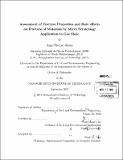Assessment of fracture properties and rate effects on fracture of materials by micro scratching: application to gas shale
Author(s)
Akono, Ange-Therese
DownloadFull printable version (19.67Mb)
Other Contributors
Massachusetts Institute of Technology. Department of Civil and Environmental Engineering.
Advisor
Franz-Josef Ulm.
Terms of use
Metadata
Show full item recordAbstract
Since 1921, several experimental methods have been implemented to measure the Griffith fracture energy. The challenge lies in providing a measure that is intrinsic and invariant with respect to external factors such as specimen geometry, loading conditions and prescribed rates. In this thesis, by combining multi-scale experiments and advanced theoretical modeling, we provide a means to characterize the intrinsic fracture toughness using microscopic scratch tests. The scratch test consists in plowing and cutting with a scratch device the surface of a weaker material and it is relevant in many fields of science and engineering, ranging from thin films and coatings, to wear of metals and polymers, and strength of rocks. In this thesis, Dimensional Analysis and Advanced Imaging are employed to demonstrate the predominance of fracture processes in scratch tests with a Rockwell C diamond probe. Based on experimental observations, Linear Fracture Mechanics models are developed that utilize an energy-based approach in order to link the scratch forces to the scratch probe geometry and the fracture properties of the scratched material. The analytical models are implemented into inverse experimental methods for the calibration of the scratch probe geometry and for the determination of the fracture toughness. In particular, the method for fracture toughness determination is shown to be precise, accurate and reproducible. This method is then extended to rate-dependent materials in order to decouple creep and fracture and assess the intrinsic fracture toughness. In particular, for homogeneous materials, a handshake is achieved between macroscopic and microscopic scratch tests. Finally this method is applied to gas shale materials, which exhibit a higher degree of complexity, including heterogeneity, anisotropy and rate-dependence. In particular, a strong directionality of the fracture behavior is observed at the microscopic scale, which is also confirmed at the macroscopic scale. Thus, throughout this work, we elucidate the physical mechanisms of failure underlying scratch tests and build a method for the multi-scale assessment of intrinsic fracture properties, which is robust, accurate, precise and reproducible, and which is applicable to a wide range of material behaviors. This in turn opens additional venues of application for scratch tests.
Description
Thesis: Ph. D., Massachusetts Institute of Technology, Department of Civil and Environmental Engineering, 2013. Cataloged from PDF version of thesis. Includes bibliographical references (pages 196-208).
Date issued
2013Department
Massachusetts Institute of Technology. Department of Civil and Environmental EngineeringPublisher
Massachusetts Institute of Technology
Keywords
Civil and Environmental Engineering.